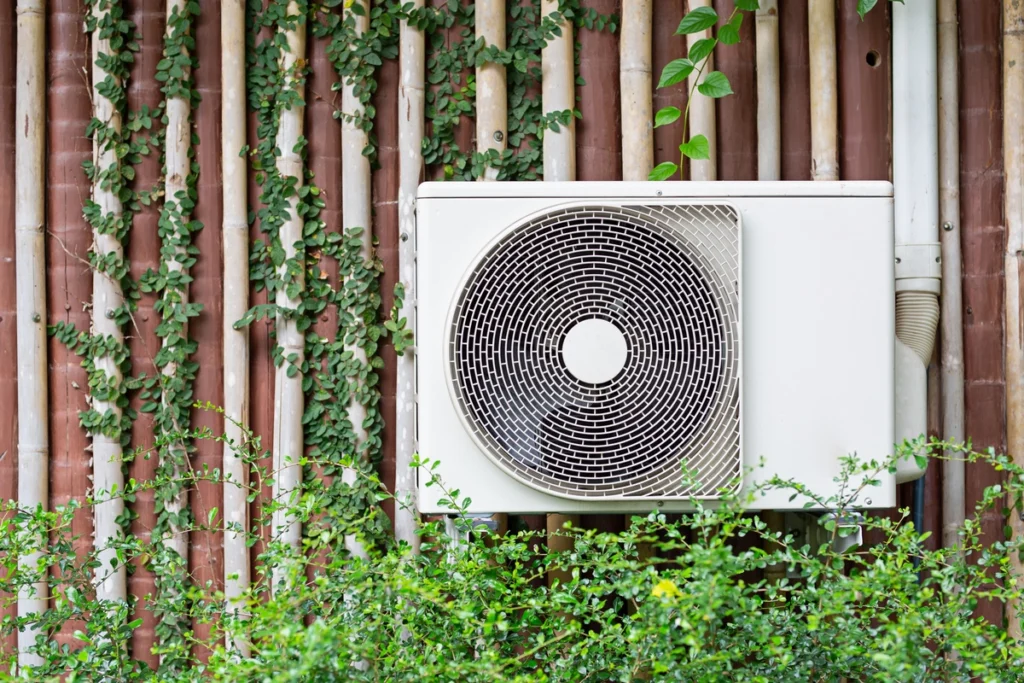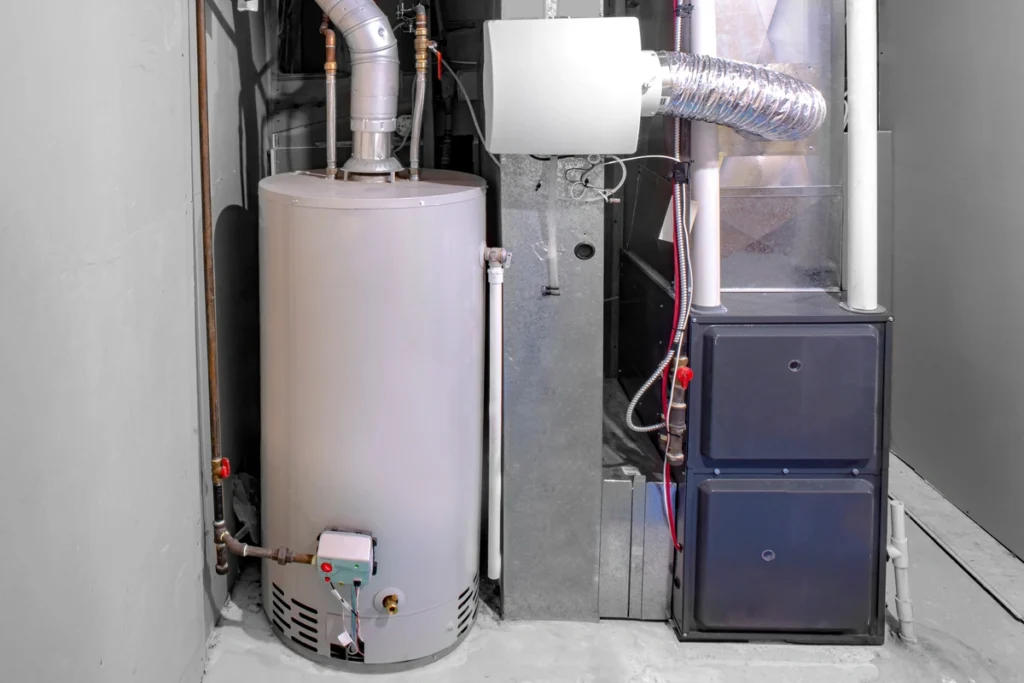When it comes to keeping your home warm during the colder months, two popular options stand out: the heat pump and the furnace. Each has its own set of advantages and drawbacks, making the decision between the two a crucial one for homeowners.
Today, we’ll delve into the workings of both heating systems, taking you through:
- Their pros and cons
- A cost comparison
- Longevity
- Guidance on choosing the right one for your needs
- Finding a qualified professional for installation
Heat pump vs. furnace…which heating system will be right for you?
What is a Heat Pump?

A heat pump is a versatile heating (and cooling) system that operates by transferring heat from one place to another. During the winter, it extracts heat from the outdoor air (even in cold temperatures) and transfers it inside to heat your home. In the summer, it works in reverse, extracting heat from indoors and transferring it outside to cool your home. This dual functionality makes heat pumps energy-efficient solutions for year-round comfort.
Pros of Heat Pumps:
- Energy Efficiency: Heat pumps are renowned for their high energy efficiency, as they simply move heat rather than generating it. This can result in lower energy bills compared to traditional heating systems.
- Environmentally Friendly: Since heat pumps use electricity to transfer heat rather than burning fossil fuels, they produce fewer greenhouse gas emissions, making them a greener option for heating.
- Dual Functionality: The ability to provide both heating and cooling makes heat pumps versatile solutions for climates with moderate temperature variations.
- Consistent Indoor Comfort: Heat pumps distribute heat evenly throughout your home, ensuring a consistent level of comfort in every room.
Cons of Heat Pumps:
- Performance in Extreme Cold: While modern heat pumps have improved cold-weather performance, they may struggle to extract sufficient heat in extremely low temperatures, leading to reduced efficiency.
- Upfront Cost: Heat pumps typically have a higher upfront cost compared to furnaces, although this expense may be offset by long-term energy savings.
- Lifespan: Heat pumps generally have a shorter lifespan compared to furnaces, typically lasting around 15-20 years with proper maintenance.
What is a Furnace?

A furnace is a traditional heating system that generates heat by burning fuel, such as natural gas, propane, or oil. The heat produced is then distributed throughout the home via ductwork and vents, providing warmth during the colder months.
Pros of Furnaces:
- Effective Heating in Cold Climates: Furnaces are well-suited for colder climates where temperatures frequently drop below freezing, as they can generate ample heat regardless of outdoor conditions.
- Lower Upfront Cost: Furnaces generally have a lower initial cost compared to heat pumps, making them an attractive option for homeowners on a tight budget.
- Longevity: Furnaces typically have a longer lifespan than heat pumps, with many models lasting 20-30 years or more with proper maintenance.
- Quick Heating: Furnaces can quickly raise the temperature inside your home, providing near-instant warmth on cold winter days.
Cons of Furnaces:
- Higher Operating Costs: Furnaces rely on burning fuel, which can result in higher operating costs, especially if fuel prices are volatile or rising.
- Environmental Impact: Burning fossil fuels releases carbon dioxide and other pollutants into the atmosphere, contributing to air pollution and climate change.
- Limited Cooling: Unlike heat pumps, furnaces only provide heating and cannot cool your home during the summer months without the addition of a separate air conditioning system.
Cost Comparison
When comparing the cost of heat pumps versus furnaces, several factors need to be considered. While heat pumps typically have a higher upfront cost, they can lead to lower long-term energy expenses. On the other hand, furnaces have a lower initial investment but may incur higher ongoing fuel costs. Additionally, installation costs can vary depending on factors such as your home’s size, existing infrastructure, and local labor rates.
According to data from HomeAdvisor, the average cost of installing a heat pump ranges from $4,000 to $7,000, while the average cost of installing a furnace is between $2,500 and $6,000. Keep in mind that these are rough estimates, and actual costs may vary based on individual circumstances.
Longevity
In terms of lifespan, furnaces generally outlast heat pumps. While a well-maintained furnace can last 20-30 years or more, heat pumps typically have a lifespan of 15-20 years. Regular maintenance is crucial for both systems to maximize longevity and ensure optimal performance.
Choosing the Right Heating System for Your Home
When selecting between a heat pump and a furnace, several factors should influence your decision:
- Climate: Consider your local climate and how it may impact the performance of each heating system. Heat pumps are ideal for moderate climates, while furnaces are better suited for colder regions.
- Energy Efficiency: Assess the energy efficiency ratings of different heat pump and furnace models to determine which will provide the greatest long-term savings on your energy bills.
- Budget: Evaluate your budget and weigh the upfront costs of installation against the potential long-term savings and operating expenses of each heating system.
- Existing Infrastructure: Take into account any existing ductwork, electrical systems, or fuel connections in your home, as these may influence the feasibility and cost of installing either a heat pump or furnace.
- Personal Preferences: Consider factors such as indoor air quality, noise levels, and desired levels of comfort when making your decision.
Finding a Qualified Professional for Installation: 5 Tips
Whether you choose a heat pump or a furnace, proper installation is essential for optimal performance, efficiency, and safety. When searching for a qualified professional to install your heating system, consider the following:
1) Credentials:
Look for HVAC contractors who are licensed, bonded, and insured to perform heating system installations in your area.
2) Experience:
Choose a contractor with extensive experience installing the type of heating system you’ve selected, whether it’s a heat pump or furnace.
3) References:
Ask for references from past clients and read online reviews to gauge the contractor’s reputation and reliability.
4) Estimates:
Obtain detailed written estimates from multiple contractors, comparing not only the total cost but also the scope of work and warranties offered.
5) Warranty:
Inquire about the manufacturer’s warranty on the heating system itself, as well as any additional warranties or guarantees provided by the contractor for installation and labor.
Professional Help With Your Furnace and Heat Pump System
In the heat pump vs. furnace debate, there is no one-size-fits-all solution. Each heating system has its own set of advantages and drawbacks, and the right choice for your home will depend on factors such as climate, energy efficiency, budget, and personal preferences. By carefully weighing these considerations and consulting with a qualified HVAC professional, you can select the heating system that best meets your needs for comfort, efficiency, and reliability.
Contact Palmetto today to get started!
